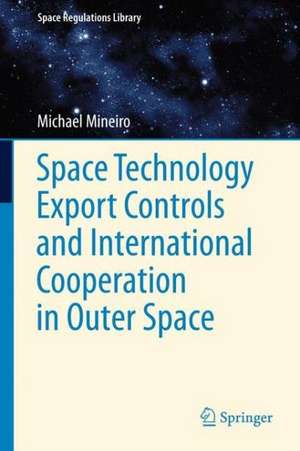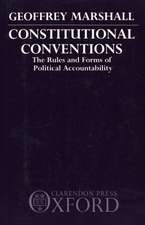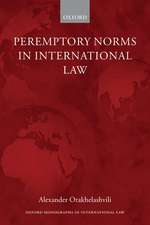Space Technology Export Controls and International Cooperation in Outer Space: Space Regulations Library, cartea 6
Autor Michael Mineiroen Limba Engleză Paperback – 26 ian 2014
What is the legal-political origin of space technology export controls? How do they relate to the current international legal structure? What steps can be taken to evolve our current unilateral paradigm of space technology within the context of peaceful exploration and use of outer space? In this book, these and other relevant questions on space technology export controls are identified and assessed through an insightful case-study of the U.S. commercial communication export control regime. The findings of this case-study are used in an international legal-political analysis of international space law, public international law, and international cooperation. Breaking new ground in international legal theory, a self-justified security dilemma that is manifest in international law is identified and explained as the origin for the current paradigm of space technology export controls.
| Toate formatele și edițiile | Preț | Express |
|---|---|---|
| Paperback (1) | 638.76 lei 6-8 săpt. | |
| SPRINGER NETHERLANDS – 26 ian 2014 | 638.76 lei 6-8 săpt. | |
| Hardback (1) | 643.34 lei 6-8 săpt. | |
| SPRINGER NETHERLANDS – 9 noi 2011 | 643.34 lei 6-8 săpt. |
Preț: 638.76 lei
Preț vechi: 751.47 lei
-15% Nou
Puncte Express: 958
Preț estimativ în valută:
122.23€ • 127.94$ • 101.73£
122.23€ • 127.94$ • 101.73£
Carte tipărită la comandă
Livrare economică 31 martie-14 aprilie
Preluare comenzi: 021 569.72.76
Specificații
ISBN-13: 9789400794306
ISBN-10: 9400794304
Pagini: 264
Ilustrații: XXVIII, 236 p.
Dimensiuni: 155 x 235 x 14 mm
Greutate: 0.37 kg
Ediția:2012
Editura: SPRINGER NETHERLANDS
Colecția Springer
Seria Space Regulations Library
Locul publicării:Dordrecht, Netherlands
ISBN-10: 9400794304
Pagini: 264
Ilustrații: XXVIII, 236 p.
Dimensiuni: 155 x 235 x 14 mm
Greutate: 0.37 kg
Ediția:2012
Editura: SPRINGER NETHERLANDS
Colecția Springer
Seria Space Regulations Library
Locul publicării:Dordrecht, Netherlands
Public țintă
ResearchCuprins
Foreword.- Preface.- Acknowledgements.- Acronyms and Abbreviations.- Table of Contents.- Introduction; Ram S. Jakhu.- PART I: An Examination of Preliminary Concerns – Conceptual Lenses.- Chapter 1. Technical Characteristics of Space Goods and Technologies that are Relevant to Export Controls.- Chapter 2. Sovereignty as the Legal Basis of Export Controls: International Law and Space Technology Controls.- Chapter 3. Policy, Economic, and Techno Globalization.- PART II: A Case Study of U.S. Comsat Export Control – A Regime In Need of Reform?.- Chapter 4. U.S. Approach to Comsat Export Controls and the Challenge of U.S.-E.U. Regulatory Divergence.- Chapter 5. U.S.-E.U. Comsat Regulatory Divergence: An Economic Impact Assessment in Light of Strategic Effectiveness .- Chapter 6. Efforts to Reform the STDA and China Launch Boycott: A Public Choice Theory Analysis.- Chapter 7. Legal Reform “Inside the Box” of the Current National Centric Paradigm: The Lacuna of Long-Term Strategic Vision.- PART III: Transcending the Case Study – Security and International Cooperation.- Chapter 8. Security and Global Cooperation in Outer Space: Space Technology Trade and Proliferation Controls as One Part of the Larger Puzzle.- Summary of Monograph Findings.- Final Conclusions: Overcoming the Dilemma of National Security and International Cooperation in Outer Space.- Epilogue: Future Areas of Research.- Bibliography.- Author Bio and Publications.- The End of the Road (Poem).- Charts and Illustrations.
Textul de pe ultima copertă
Export controls definitively impact international cooperation in outer space. Civil and commercial space actors that engage in international endeavors must comply with space technology export controls. In the general discourse, members of the civil and commercial space community have an understanding of their domestic export control regime. However, a careful reading of the literature on space technology export controls reveals that certain questions relevant to international engagements have not been identified or answered.
What is the legal-political origin of space technology export controls? How do they relate to the current international legal structure? What steps can be taken to evolve our current unilateral paradigm of space technology within the context of peaceful exploration and use of outer space?
In this book, these and other relevant questions on space technology export controls are identified and assessed through an insightful case-study of the U.S. commercial communication export control regime. The findings of this case-study are used in an international legal-political analysis of international space law, public international law, and international cooperation. Breaking new ground in international legal theory, a self-justified security dilemma that is manifest in international law is identified and explained as the origin for the current paradigm of space technology export controls.
What is the legal-political origin of space technology export controls? How do they relate to the current international legal structure? What steps can be taken to evolve our current unilateral paradigm of space technology within the context of peaceful exploration and use of outer space?
In this book, these and other relevant questions on space technology export controls are identified and assessed through an insightful case-study of the U.S. commercial communication export control regime. The findings of this case-study are used in an international legal-political analysis of international space law, public international law, and international cooperation. Breaking new ground in international legal theory, a self-justified security dilemma that is manifest in international law is identified and explained as the origin for the current paradigm of space technology export controls.
Caracteristici
Identifies and examines the nexus between international law and domestic space technology export controls Examines E.U. regulatory divergence and its impact on the international commercial communication satellite market Offers a political analysis of contemporary U.S. export control reform debate Presents pragmatic proposals for U.S. export control, regulatory policy, and legislative reform




















